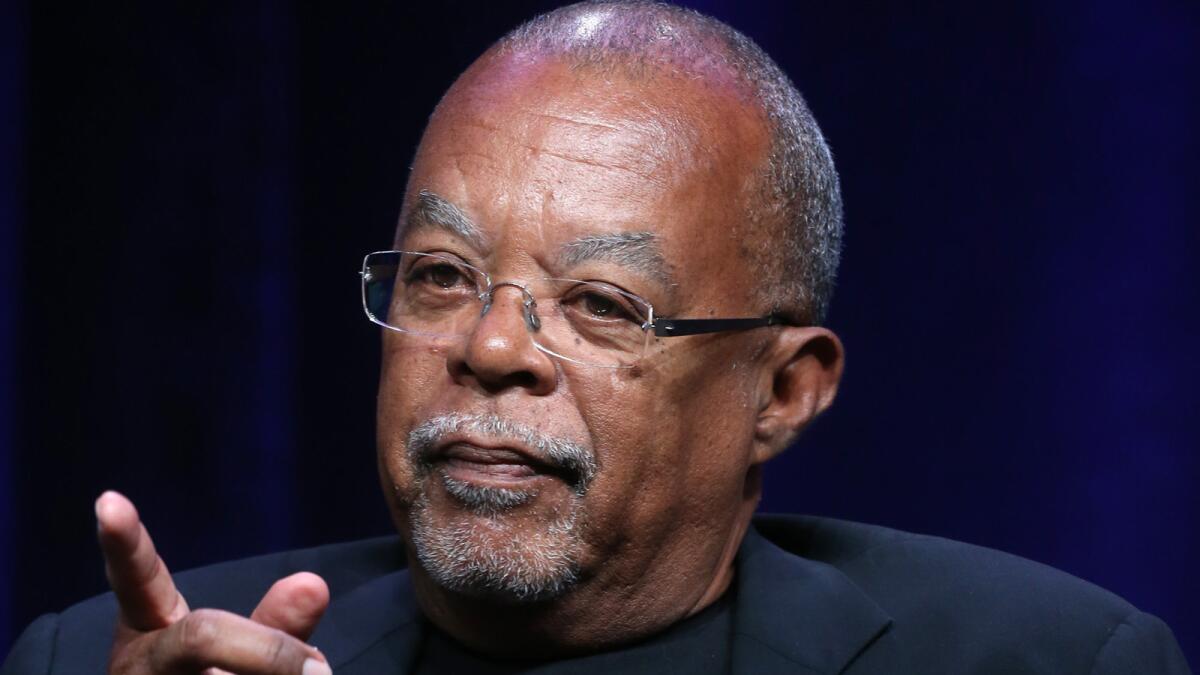PBS to delay third season of ‘Finding Your Roots’ following review of scandal

Henry Louis Gates Jr.
This week Henry Louis Gates Jr. once again found himself in the middle of another national teachable moment about race.
The first time, six years ago, seemed to end amicably enough over beers on the White House lawn in a summit with the new president, the Emmy Award-winning black Harvard professor and the white police officer whose arrest of Gates at his Cambridge home caused a national uproar over policing and race.
But in the wake of an internal PBS review released earlier this week that found Gates’ popular genealogical program “Finding Your Roots” improperly deleted mention of a slaveholding ancestor of actor Ben Affleck, scholars are urging once again for the nation to face its dark history.
“What’s most important is that we’re discussing this issue, which is why it’s important not to paper this over,” said Darnell Hunt, director of UCLA’s Ralph J. Bunche Center for African American Studies. “Just because Ben Affleck didn’t want his dirty little secret known doesn’t mean it shouldn’t be part of the discussion. We do ourselves a disservice by keeping that out of our ongoing national discussion about race.”
The PBS review made public on Wednesday afternoon found Gates, who hosts the program that examines the family trees of celebrities, inappropriately bowed to pressure from Affleck to make the actor’s genealogical past less controversial.
Gates and his fellow producers “violated PBS standards by failing to shield the creative and editorial process from improper influence, and by failing to inform PBS or WNET [the PBS member station where the program originates] of Mr. Affleck’s efforts to affect program content,” a summary of the review provided to the media on Wednesday stated.
The network announced that it was delaying the return of the show’s third season, which was already in production. Furthermore, PBS is postponing a decision altogether about a possible fourth season.
A return date for the third season of “Finding Your Roots” will not be set until PBS is assured the same mistake will not be repeated, said network officials. PBS ordered “corrective measures” for Season 3, which included hiring more researcher/fact-checking help and obtaining an independent genealogist to review programs for accuracy.
The network said a decision about a possible fourth season is being deferred until “confidence” has been restored in the program’s editorial integrity. One PBS executive not authorized to discuss the matter publicly believed that the uncertain fate of the fourth season is “a big slap” at Gates.
The network’s executives are not expected to make a decision on the fourth season until the spring of 2016. They will likely gauge viewer and member-station reaction before ordering an additional season.
That could hurt Gates, who issued an apology Wednesday, from an economic standpoint. Program suppliers typically want orders for as many episodes as possible, as advanced planning helps them get the most out of their budgets. Instead, he’ll have to gear up production again after a long hiatus. But even if “Finding Your Roots” goes away, Gates — the man behind the network’s award-winning 2013 historical series “The African Americans: Many Rivers to Cross” — is expected to continue making documentary programs for PBS, the executive noted.
“Finding Your Roots” became embroiled in controversy earlier this year when hacked emails surfaced on WikiLeaks in which Gates lamented to a top Sony boss that Affleck was pushing for the PBS show to remove content about the slave owner in his family tree. The episode did not discuss the relative and focused on other members of Affleck’s family.
Affleck apologized in April for his role in the situation, saying, “I was embarrassed. The very thought [of such an ancestor] left a bad taste in my mouth.” The actor has not reacted publicly to PBS’ decision this week to delay Gates’ show or to deleting his episode from further airings.
Slavery is an issue the Gates program has confronted many times in its previous two seasons. Other prominent guests have had to face a direct and often uncomfortable link to America’s slaveholding past.
Last season, Gates presented New York Yankee Derek Jeter, CNN anchor Anderson Cooper and filmmaker Ken Burns with documentation that uncovered family members who owned slaves in past centuries.
“I know Ken was horrified to have a Confederate ancestor, and I go, ‘Aw, man, it’s OK,’” said Gates in an interview with The Times last year about the series. “Here I am a black man comforting white people about having a Confederate ancestor.
“We’re not judging anyone,” Gates added. “There were a lot of people that owned slaves. There were black people that owned slaves. And most of the people who didn’t own slaves didn’t own them not for any moral reasons but because they couldn’t afford them.”
Times staff writer Scott Collins contributed to this report.
More to Read
The complete guide to home viewing
Get Screen Gab for everything about the TV shows and streaming movies everyone’s talking about.
You may occasionally receive promotional content from the Los Angeles Times.








